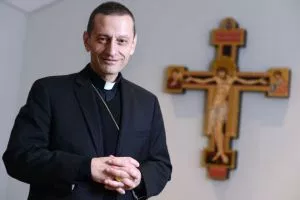At the Synod on Youth, Archbishop Anthony Fisher, O.P., of Sydney has made a quite unconventional apology to Catholic youth: not only for wrongful acts committed, but also for failures to hand on the faith in its fullness, including “unbeautiful liturgies” and poor preaching.
The Catholic Herald writes:
In addition to apologising for the Church’s failures with clerical sexual abuse, the archbishop also apologised for the ways in which the Church had failed to “introduce you to the person of Jesus Christ, his saving word and his plan for your life.”
“And for the times when you were searching for your sexual, ethnic or spiritual identity and needed a moral compass, but found Church people unsympathetic or ambiguous: I apologise,” he said.
The Catholic Church, Archbishop Fisher said, often “sold you short” by not challenging young people to live up to their baptismal call to holiness, by offering them “unbeautiful or unwelcoming liturgies” and by not sharing with them Church traditions such as the sacrament of reconciliation, pilgrimages and Eucharistic adoration.
He apologised for “poor preaching, catechesis or spiritual direction” that failed to inspire conversion and for families, dioceses and religious orders that adopted a “contraceptive mentality” that did not even try to give birth to new vocations.
In addition to his apology, the Sydney archbishop pleaded with young people: “Never give up on Jesus because of our failures. Never give up on the Church that you can help make more faithful. Never give up on the world that, with Christ and the Church’s help, you can make a better place.”
Photo credit: screenshot from Twitter.
 published in Finland.
published in Finland. Some samples from an album by duo Vox Silentii are on the net:
Some samples from an album by duo Vox Silentii are on the net:

 Bishop Frank Caggiano of Bridgeport
Bishop Frank Caggiano of Bridgeport 